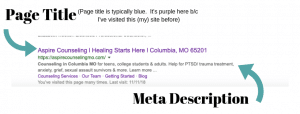What is SEO for Speech Therapists?
As a speech therapist, you understand the importance of effective communication. But when it comes to online marketing, you may find yourself struggling to be heard in a crowded digital space. That’s where SEO comes in. SEO, or Search Engine Optimization, is the process of optimizing your website to rank higher in search engine results pages (SERPs). In this article, we’ll dive into what SEO is and how it can benefit your speech therapy practice.
As a private practice owner myself, I understand how hectic, challenging AND rewarding all of the marketing and business side of things can be! When I started learning SEO there weren’t many “comprehensive guides” or online courses out there. I read a ton of traditional books, listened to several podcast episodes a day, etc. Now, the Simplified SEO Consulting team wants to make your job easier. I’ll break down many of the important components of SEO and how they apply specifically to private practices like yours below. And then, feel free to check out our SEO services for Speech Language Pathologists.
The Basics of SEO
SEO is the practice of improving your website’s visibility in search engine results pages (SERPs). The goal is to increase the quality and quantity of traffic to your website through organic search engine results. Organic search engine results are unpaid listings that appear on SERPs. This is different from paid advertising, which is displayed at the top or bottom of the SERPs.
Why SEO is Important for Speech Therapists?
SEO is important for speech therapists because it allows potential clients to find you online. When someone searches for “speech therapy near me” or “speech therapist in [city],” you want your practice to appear at the top of the results page. By optimizing your website for search engines, you can increase the likelihood of being found by potential clients.
Think of your website as a library filled with books that hold valuable information for your clients. Without proper labeling, however, those books would be nearly impossible to find. The same goes for your website – without proper SEO, potential clients won’t be able to find the valuable information you offer. By optimizing your website, you make it easier for people to find and access the resources they need, ultimately helping more people and growing your practice.
How Search Engines Work
Have you ever wondered how Google decides to rank a university’s speech department’s website with hardly any content at all on the first page while your website is struggling to stay on the third? The truth is, Google’s super secret algorithm has LOTS of things it considers when deciding what website to rank well. I say “super secret” because it’s not published anywhere. However, we do have a good idea of what many of the things they’re looking at include.

To understand SEO, it’s important to understand how search engines work. Search engines use complex algorithms to determine which pages to display in the search engine results pages (SERPs). These algorithms take into account a number of factors, including keywords, content relevance, and backlinks. In fact, search engine algorithms are constantly evolving, so it’s important to stay up-to-date on the latest SEO best practices.
Specific SEO Strategies for Speech Therapists
Now that you understand the basics of SEO, let’s look at some practical strategies for optimizing your private practice website for search engines. We always want to make sure that our blog posts are giving business owners really practical advice. So…let’s hop to that advice part:
Start with Keyword Research
Most effective SEO work begins with Keyword Research. Admittedly, this is the hardest SEO thing we teach. So I’m not a fan of it coming at the start of SEO work. However, don’t overthink this. You’re simply looking for a few keyword phrases that are in the ballpark of what your ideal clients are looking for.
Focus on Long-tail Keywords
Long-tail keywords are longer, more specific phrases that potential clients may search for. Using long-tail keywords can help increase the chances of your website ranking higher in search results. For example, instead of just using the keyword “speech therapy”, consider using “pediatric speech therapy for language delays” to target a specific audience and improve your chances of showing up in relevant search results.
A few of the keyword research-focused blog posts we’ve written:
- Keyword Research Tips for Speech Therapists
- Using Inclusive Keywords
- Keyword Research Tools
- Value of Long-Tail Keywords for SLPs
- Common Keyword Research Mistakes
- Incorporating keywords when you write
On-Page SEO
On-page SEO refers to optimizing the content on your website. This includes optimizing your website’s meta titles and descriptions, header tags, image alt tags, and content. By using relevant keywords in your content, you can increase your website’s relevance for certain search queries. Additionally, you can improve the user experience by optimizing your website’s loading time and making sure that it is mobile-friendly. We have a ton of free advice throughout our SEO blog on how to do these things.
Honestly, on-page SEO is probably my personal favorite part of optimizing websites. It’s taking good, helpful content you’ve written for clients and making it even better! Because you and Google share the same goal: to show your websites to the people who are truly looking for your services. So, if you’re optimizing a page of your website you’re not only making it easier for Google to rank your website but hopefully also making it easier for potential clients/patients.
Some blog posts we’ve written related to on-page SEO that you may find helpful include:
- On-Page SEO for Speech Therapists
- Effective Headings & Subheadings for Speech Therapists
- On-Page vs. Off-Page SEO
- On-Page SEO for Mental Health Therapists – examples in this one are specific to counselors, therapists, and psychologists but the same principles will apply to your private practice website.
Off-Page SEO for SLPs in private practice
Off-page SEO refers to activities done outside of your website to improve its rankings in search engines. This includes building backlinks from other authoritative websites, as well as engaging with people on social media. By building relationships with other professionals in the SLP space and engaging with potential clients on social media, you can improve your website’s off-page SEO.
Blog Posts about Building Backlinks:
- Guest Blogging for SLPs
- 3 Tips for Writing Guest Blog Posts
- Improve Local SEO & 3-Pack rankings
- Why & How to earn Backlinks as an SLP
- 4 of My Most Surprising Backlinks
- Guide to Earning Backlinks
Local SEO
Local SEO is a type of SEO that focuses on optimizing your website for local search queries. It helps you show up more often when people search for keywords that include “near me” or a location in the phrase. Local SEO is particularly important for speech therapists who have a physical location. By optimizing your website for local search queries, you can increase the likelihood of being found by potential clients in your area. Local SEO strategies can include creating a Google Business Profile, adding local pictures and references to local people on your website, adding your address to the footer of your website, and participating in a list management service to get your name, address, and phone number out consistently across the web.
Blog posts we’ve written about Local SEO include:
- Google Business Profile for SLPs
- Local SEO Tips for Speech Therapists
- SEO Benefits of Writing Local-Focused Blog Posts
- Google Business Profile Tips for Multiple Offices
- Writing an SEO-Focused Google Business Profile Update
- Heatmap Tips
- What is List Management?
Content Marketing
Content marketing involves creating and distributing valuable, relevant, and consistent content to attract and retain a clearly defined audience.
Google really wants to send people to the websites that are most likely to have the answers searchers want to find when they type in their question, phrase, or other query. Content marketing can help you do this. It does so by creating content that helps potential clients find the information they need. This includes writing blog posts and other content to answer common questions about speech therapy, as well as creating videos, podcasts, and other forms of content.
Content-focused blog posts we’ve written:
- Why High-Quality Content Matters for SEO
- Using ChatGPT to Write SEO-Friendly Content
- What it Means to be a Content Area Expert & How
- A Guide to Cornerstone Content
- Revolutionize Your Website With These Blogging Tips
Analytics and Tracking
Analytics and tracking are essential to measuring the success of your SEO efforts. By using tools like Google Analytics, you can track website traffic, user behavior, and other important metrics. This information can help you identify areas for improvement. Then, you can adjust your SEO strategy accordingly. I also generally recommend a keyword monitoring tool. Simplified SEO Consulting clients have a specialized data dashboard where they can monitor various data related to SEO including keyword rankings. However, if you’re not our client there are tons of other keyword tracking tools available. You can find these through major SEO websites such as Mangool’s Keywords Everywhere tool, SEMRush, Moz or even Neil Patel’s tools.
Keep Your Website Up-to-date
Search engines favor websites that are regularly updated with fresh and relevant content. In other words, technical problems on your website like 404 errors can hurt your ranking. So, make sure to update your website regularly. You can do this with new blog posts, articles, and other helpful resources. Not only does this improve your chances of ranking higher in search results, but it also shows potential clients that you are active and engaged in your field. It sets you up as an expert and means they come in already trusting you more. So, make sure all of your website plugins (if you have a WordPress site) are up to date, you’ve got the latest version of your theme and you’re regularly putting out content.
Utilize Meta Descriptions
A meta description is a brief summary of what your website is about that appears in search results. It’s important to craft a clear and concise meta description. It’s great if you can also include 1-2 of your target keywords that accurately represent your website’s content. This helps potential clients understand what your website is about. The clarity a meta description provides can help convince someone to actually click on your website when it does show up in search results.
We’ve written a number of blog posts on this topic including:
- Meta Description Examples for SLPs
- Tips for Writing a Meta Description
- Meta Descriptions for Blog Posts
Optimize Your Images
Images can greatly enhance the user experience on your website. But, photos can also slow down your site’s load time if they are too large or not optimized. The best practice for SEO is to make sure to compress your images before uploading them to your website. I also always recommend that you add alt text that includes your target keywords to improve your photos after loading them. This is great for accessibility AND SEO.
Lastly, keep in mind that it’s important to be inclusive in photos on your website. Make sure your photos represent the clients you serve. If you often work with clients who have specific needs, that should be an important consideration when you’re placing photos on your site. Clients want to see that you work with people who look like them, use communication devices like they do, etc. If you frequently work with clients with hearing loss, use some photos of kids with cochlear implants. If you work with kids who have down syndrome find photos of kids with down syndrome. You likely teach clients to use communication devices, so find some photos of those.
Avoid Black Hat SEO
If it sounds too good to be true. It probably is. If someone promises you first-page rankings, it’s probably an SEO scam. If they offer to let you buy backlinks (even if they say the backlink has a Domain Authority of X), they probably aren’t following Google’s guidelines and therefore buying their services could ultimately really hurt your SEO. When a company engages in these types of techniques, it’s called “Black hat SEO” and you should avoid these at all cost.
Best Practices for SEO on a Private Practice Website
To get the most out of your SEO efforts, it’s important to follow best practices. Quality, effective, ethical SEO techniques include all of the things we’ve talked about in this blog post. Most importantly, I recommend you always, always, always follow Google’s guidelines. These are currently called “Google Search Essentials” and were previously called Google’s Webmaster Guidelines. There are a lot of shady SEO tricks out there that could get your website penalized. So, if it sounds too good to be true (promised first-page results or thousands of backlinks overnight), it probably is. Just make sure you’re being ethical when it comes to SEO and following Google’s guidelines.
Do I have to Blog for Good SEO?
I mean, no. You don’t absolutely have to. In fact, I recently wrote the Non-Blogger’s Guide to SEO Success. However, as you’ll notice when you read through that, it is much easier to get ranking quickly WITH a blog. So….here are some tips for writing great, effective blog posts that will improve the SEO for your private practice website:
- Blog Post Topic Ideas for SLPs
- Blogging Tips for Speech Therapists
- More Blogging Tips for SLPs
- Why do Blog Posts Matter so Much?
Good, Lasting SEO for Private Practices Takes Time
Unfortunately, great SEO generally doesn’t happen overnight. It can take several months or even longer before you start seeing meaningful results from your SEO efforts. But SEO for speech therapists can be really powerful and effective in helping you build your business and attract more clients. We generally tell the private practices we work with to expect it to take about 6 months of actively working on SEO to start getting more calls. So, don’t be discouraged if you don’t see immediate results. Keep at it and eventually, you will start seeing the impact of your SEO efforts on your website’s search engine rankings.
SEO can be an incredibly powerful way for private practices to get in front of more potential clients. By following the tips outlined above, you can start to make improvements and increase your website’s visibility in search results. With patience and dedication, you can create a strong SEO strategy that will help bring more clients to your practice. Good luck!
Support For SLPs working on their SEO
Are you ready to start improving your SEO and getting in front of more clients? We’d love to help. The Simplified SEO Consulting team helps private practices in the helping professions attract more of their ideal clients to grow their business. We started out exclusively helping mental health counselors and then branched out to help SLPs, dieticians, birth workers (doulas, midwives, lactation consultants), physical therapists, psychiatrists, private practice physicians, and even education professionals (IEP advocates, tutors, etc). What we’ve found is that our comprehensive approach to SEO is effective for helpers in all of these professions. And, as a social worker who worked with a couple of AMAZING Speech Therapists in a school environment a while back and then received amazing SLP services for my daughter who had choking problems as an infant, I have a special fondness for working with private practice SLPs personally.
Wondering what specific SEO services we offer for speech therapists? Honestly, any of our services can be adapted for speech therapy and we seek to offer SEO services to fit a wide range of needs. We offer affordable DIY online SEO courses, a small group intensive to support you through optimizing, a 12-week 1:1 training program to give you really individualized support optimizing, and our ever-popular “Done for You” SEO program where we still work closely with you but do a lot of the SEO heavy lifting for you. That said, our online courses do still primarily have content that uses mental health therapist websites as examples, so you will see fewer speech therapy-specific examples compared to if you go with one of our other services. However, the content is still fantastic and should be relatively easy to apply to your site.
So, if you’re ready to get to work and attract more of your ideal clients, we’re ready to support you every step of the way! Fill out our pre-application today to get started!
About the Author
Jessica Tappana is the founder and CEO of Simplified SEO Consulting. She owns a private psychotherapy practice in Missouri with two locations and about 12 clinicians. She is passionate about helping people improve their quality of living. And, she has seen firsthand the amazing work SLPs can do. While she has always loved helping private practices, she’s also excited that Simplified SEO Consulting is branching out and offering more SEO services for SLPs in private practice too! She enjoys creating helpful content about SEO for speech therapists in private practice. So, keep an eye out for more helpful tips!


 Local Citations on Directories
Local Citations on Directories
 Rankings
Rankings
 Neglecting the importance of local SEO
Neglecting the importance of local SEO
 About the Author:
About the Author:
 Create quality content
Create quality content Either
Either
 Write catchy, informative, and keyword-filled headlines and subheadings within the content body of each blog post.
Write catchy, informative, and keyword-filled headlines and subheadings within the content body of each blog post. Practice
Practice

 Practice Website
Practice Website SEO Services for Private Practice Owners
SEO Services for Private Practice Owners
 Websites
Websites